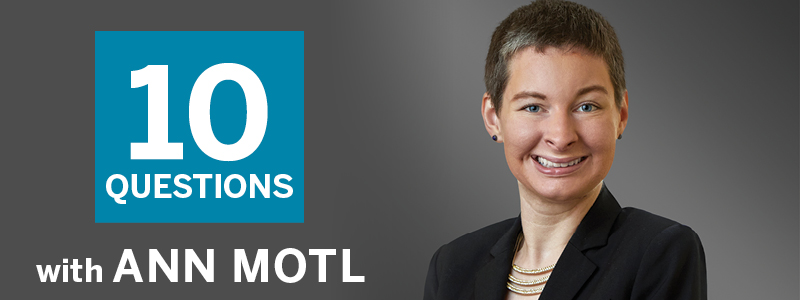
In this month’s 10 Questions, we feature Ann Motl, an associate at Greenberg Traurig LLP who practices in products liability.
1. As a litigator who represents medical device manufacturers, what is a typical day at the office?
Each day is different, but there are common themes in my day-to-day work. I am the technical go-to person on my team, so I spend a lot of time reviewing my clients’ technical documents and talking to their engineers to have a comprehensive understanding of the technology we are defending. Then, I translate that understanding into work product for my team, our in-house attorneys, and judges/juries.
2. What is the most rewarding part of your job?
Finding innovative ways to help my partners and clients. My firm partners and clients deal with complex legal and technical issues, and any time I can identify and propose an innovative solution—such as a new technological tool, a new legal argument, or a new way of organizing information—that is a good day for me.
3. You studied mechanical engineering at St. Thomas. How does your engineering background influence your legal practice?
I studied engineering with the hope of becoming a biomedical engineer. Now, as an attorney representing medical device companies, I work with my clients’ biomedical engineers on a regular basis. I love speaking with them and learning about existing and future medical devices.
4. Growing up on a dairy farm in rural Minnesota, how was the transition to living in the Twin Cities?
The transition was jarring. I grew up twelve miles outside of town and it had only one stoplight. In the beginning, I felt isolated from my classmates, many of whom attended private high schools in the cities. Eventually, I found my place and made connections with people from a variety of backgrounds.
5. You live with a neuromuscular condition and rely on a wheelchair for mobility. What would you like Hennepin Lawyer readers to know about their colleagues with disabilities?
That we are capable and can succeed in this profession. Each minority group has their own stereotypes to contend with, and many people explicitly or implicitly believe disabled people are not capable of doing professional work and should be pitied. Despite my academic achievements, when I started in private practice, one attorney assumed I was not able to write a memo. Although I do not physically type, I have used voice dictation software to write many memos in my legal career.
6. When you aren't in the office, how do you like to spend your time?
I sing in a community choir and stay involved with the Federal Bar Association. I also enjoy taking virtual cooking classes with my partner and spending time with my cat.
7. What book are you reading these days?
The Plague of Doves by Louise Erdrich
8. Complete this sentence: Everyone who knows me knows I love …
The Minnesota State Fair.
9. Who is your dream dinner party guest?
Judy Heumann. She has been a lifelong disability advocate, and some of her major work was featured in the Oscar-nominated documentary Crip Camp.
10. Tell us about your work advocating for people with disabilities.
In my pro bono work, I try to serve clients with disabilities, and I have been able to do so in a variety of areas of law, including Social Security disability, habeas, housing, and more. In the legal field, I am doing my best to support and elevate disabled professionals. I, along with some others, are in the beginning steps of creating a Minnesota affinity bar for disabled lawyers and allies. Please reach out to become involved! motla@gtlaw.com